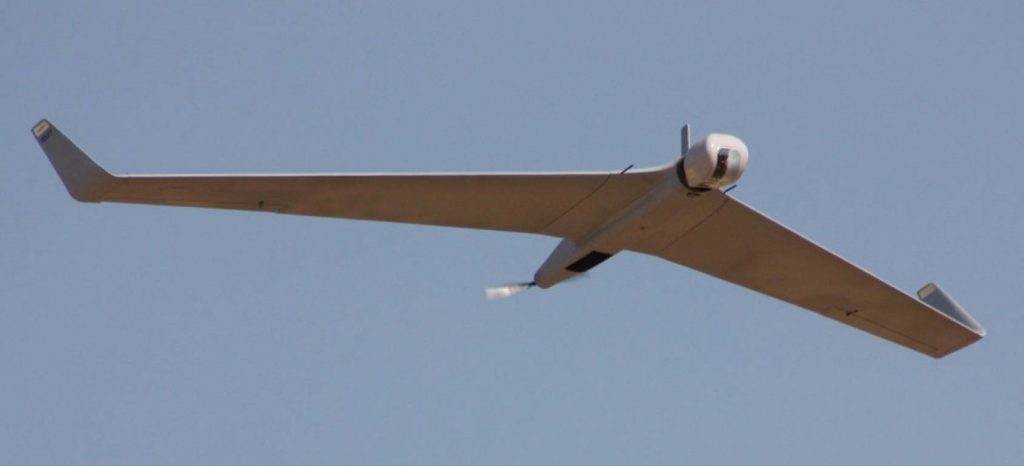TEL AVIV (A.W.)—The Israeli Ministry of Defense has frozen some Aeronautics Defense Systems licenses, preventing the firm from exporting its military drones to Azerbaijan.

The action comes after the Ministry’s investigation into whether Aeronautics was asked to demonstrate the use of an unmanned armed aircraft in Azerbaijan against an Armenian military position, the Israel-based Haaretz newspaper reported.
Aeronautics announced that on Aug. 29 the defense ministry had frozen the marketing and export licenses of the Orbiter 1k to “an important customer of the company in a foreign country” . Though the company did not mention the name of the country, Azerbaijan has been the company’s most important customer recently.
According to the report, Aeronautics cannot export the unmanned aircraft to Azerbaijan, demonstrate its use, or form any ties with representatives of the Azerbaijani army involving the drone. The contract for supplying the drone totals $20 million over the next two years, according to Aeronautics.
The Defense Ministry did not respond to Haaretz’ inquiry on the subject or confirm that the licenses have been frozen, and said the investigation is still in progress, Haaretz reported.
The Israel-based Maariv newspaper reported in early August that Israel’s defense ministry had recently received a complaint claiming that a team from Aeronautics Defense Systems traveled to Azerbaijan with the intention to finalize a contract for the sale of company’s Orbiter 1K drone, and that they were asked to deploy the armed aircraft against a military position of the Armenian Armed Forces. Aeronautics Defense has denied the allegation, claiming that the deployment was carried out by the purchaser of the aircraft and that the company never demonstrates the operation of the drone on live targets.
“Aeronautics markets its products to customers in about 50 different countries, only in accordance with approval from the Defense Export Controls Agency. The operational action was carried out by the purchaser alone and on its responsibility. Aeronautics has never carried out demonstrations on live targets, and that was true in this case as well,” the company said in a statement when the initial report was released.
According to some reports, the two Israeli operators of the aircraft refused to strike the Armenian position and were then threatened after remaining firm in their refusal. Eventually, a senior representatives of the company armed and deployed the drone.
The unmanned aircrafts are said to have missed their targets and no damage was caused. According to the complaint, one of the drones struck at a distance of about 330 feet from the Armenian military position.
This is the first significant step taken by the Defense Ministry against Aeronautics Defense Systems since the reports about the use of its drone on Armenian positions.


“The contract for supplying the drone totals $20 million over the next two years, according to Aeronautics.” In fact, Israeli aid totaled several billions of US dollars over the recent years. But somehow we don’t see much criticism on these pages of Israel’s arms supplies to Azerbaijan. Not to say that Israel is the US principal ally in the greater Middle East region.
That does not mean they cannot or will not sell the drones to third parties who will then sell it to azerbaijan. Israel is very clever with diverting the issue. The fact remains that the sale was made to azerbaijan irrespective as to who did what is secondary. The damage was done and all this for MONEY and the hurt it does to the civilians.
Azerbaijani deployed an Israeli-made Harop Drone, during the April, 2016, Karabakh War. The Israeli made drone, tipped with explosives, was used as a kamikaze aircraft, during the April 2016 war, and is credited with killing seven Armenians in a transport bus: “The drone slammed into a bus carrying Armenian volunteer soldiers and killed seven people, according to the Armenian defence ministry.”
The Washington Post, a neutral source, first reported the April, 2016, drone attack, with Azeri video footage, which showed it swoop down (in the fashion of Japanese Kamikazes), and explode after striking its ground based target. The bus itself wasn’t visible in the video footage.
Joseph Dempsey, a research analyst, concluded that it was indeed an Israeli Harop Drone, also called a loitering missile, because it can hover for six hours before striking its target. Azerbaijan was one of three countries known to import the Harop Drone, in April, 2016.
http://www.telegraph.co.uk/news/2016/04/08/suicide-drone-used-for-first-time-in-fighting-between-azerbaijan/